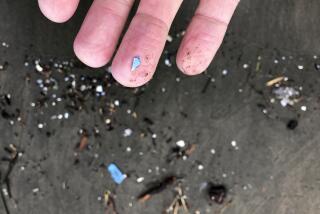Coffee Study Stirs Up More Questions on Health Effects : Medicine: The latest research suggests that decaf--not the regular brew--may increase the risk of heart disease. The decaffeinating process might be to blame.
- Share via
By removing caffeine from coffee in an attempt to reduce the risk that the popular drink would cause heart disease, U.S. coffee manufacturers may have inadvertently increased the risk of heart disease among drinkers of decaffeinated coffee, researchers said Thursday.
A small but growing body of evidence hints that the process now most often used to remove caffeine from coffee--exposing it to superheated water--may lead to the production of chemicals that increase the levels of “bad” cholesterol in the coffee-drinker’s bloodstream and thereby increase the incidence of heart disease.
“I think that’s quite possible,” said epidemiologist John J. Albers of the University of Washington Health Sciences Center.
“Throughout the history of studying coffee,” added epidemiologist Cedric Garland of UC San Diego, “decaf coffee has been as strongly or more strongly associated with adverse health outcomes than regular coffee. Whatever it is that’s bad in coffee may be enhanced by (the decaffeinating process).”
This still-tenuous theory is buttressed by reports Thursday from the Harvard Medical School that drinking regular coffee seems to pose no risk of heart disease, but that decaf is associated with a 60% increase in risk. But the authors of the paper stopped short of blaming the increased health risk on the manufacturing process.
“There is a hypothesis that the decaffeinating process is atherogenic (causes heart disease),” said epidemiologist Eric Rimm of Harvard. “There hasn’t been enough research in the area yet to make that bold statement, but the bottom line of our research is that you don’t have to switch from caffeinated to decaffeinated anyway,” so why take the risk?
Nevertheless, Rimm says recent studies involving the effects of super-hot water on coffee are what spurred his research.
Within the past 18 months, two Dutch studies have shown that coffee prepared by the European technique of soaking grounds in boiling water raised blood levels of low-density lipoproteins, the so-called bad cholesterol, by about 10%. The primary author of one of those studies, Diederick E. Grobbee of Erasmus University Medical School in Rotterdam, spent a year on sabbatical at Harvard to participate in the new study.
Also recently, H. Robert Superko of Stanford University’s Lipid Research Clinic reported that the blood levels of low-density lipoprotein increased an average of 7% in 181 men who drank decaf for the study. That study has been widely criticized but has not been disproved.
“I wish I knew what the chemical effects (of decaffeination) are,” Garland added, “but this information is held very closely by the industry. . . . You are up against a brick wall in getting information about the detailed concentration of various constituents in the product. It’s a shockingly bad situation from the perspective of sorting out the health effects of coffee.”
Cardiologist Harvey Wolinsky of the Mt. Sinai Medical Center in New York City, who has frequently defended coffee against health critics, took strong issue with the possibility that the decaffeination process may be at fault. “Nothing other than boiling has been associated with raising (cholesterol),” he said.
Superko took strong exception to that statement, however, indicating that his study with decaf had been intensively reviewed by his peers and never shown to have been wrong. Superko also added that, with the water process for decaffeination, “Chemical reactions go on all the time. Within that process, creating a compound that promotes cholesterol increases is not only possible, it is also likely.”
Meanwhile, coffee lovers are left with good and bad news.
The good news is that one more large study, the latest in a seemingly endless line, has shown that regular coffee is probably not harmful in reasonable quantities. The Harvard researchers studied 45,589 male health professionals (women will be covered in a separate study) who were healthy in 1985, when information on their coffee-drinking and other habits was collected.
They found that the men who drank as many as five cups of coffee per day had no higher risk of cardiovascular disease than those who drank none. A recent, similar study from researchers at the Kaiser Permanente Medical Center in Oakland found a 40% increase in the risk of heart disease among individuals who drank that much coffee. Most scientists attribute the difference in results to the fact that the Kaiser study contained both men and women of a much broader range in ages and states of health at the beginning of the study.
For the time being, no one is taking a strong position on the possibility that the decaffeination process is a problem. “There could be a link,” said Basil Rifkind of the National Heart, Lung, and Blood Institute. “That is something, among many other things, that is worth thinking about and studying further. But there’s not a great deal of evidence to suggest that the public should be doing anything different.”






